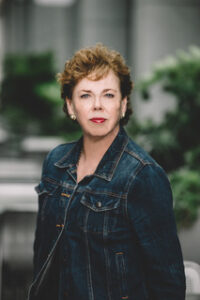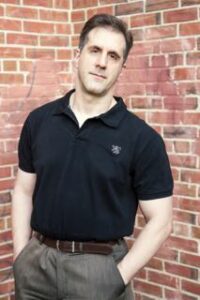
Photo BY Ben Livengood
More than twenty years ago, dramatic soprano and Chappaqua resident Dominique Hellsten first heard the music of composer Viktor Ullmann who ultimately perished in Auschwitz. “It had a profound impact and it never left me,” said Hellsten, whose eyes teared up during our interview as she shares why she is so enamored with his music and passionate about bringing it to a wider audience. At the time, the Swedish-born Hellsten was living in London and performing at such venues as the Royal Albert Hall, the Purcell Room, Southwark Cathedral and Westminster Abbey.
She was first introduced to Vienna-born composer Viktor Ullmann’s music through her UK-based publicist at the time, Diana Hirst. Hellsten has always had a special affinity for art song (also known as lieder in German) specifically music of this genre composed in the 20th and 21st century. Ullmann was a prolific composer of this particular genre who wrote more than 20 pieces while imprisoned in Theresienstadt, a concentration camp located in Czechoslovakia that served as a transport point specifically designed by Hitler to deceive International Red Cross workers and other inspectors.
Much has been written of the incredibly diverse group of artists who were interned at the camp from opera composers, to choral directors to chamber musicians. The camp was a hotbed of musical activity notes author Joza Terezin in the book “Music of Terezin”. In fact, the prisoners gave several concerts and performances for the Nazis as well as fellow prisoners. Ullmann known for his talent was assigned to the Administration of Free Time Activities (Freizeitgestaltung in German) in the camp as a music critic and organizer of musical rehearsals.

PHOTO BY Jonathan Levin
Concert Explores Ullmann’s Music
Hellsten, who today offers private voice and piano coaching to students throughout Westchester, was delighted to share Ullmann’s music in a recent musical concert featuring much of Ullmann’s work as well as other deceased composers of the art song genre to audience members. The lunchtime concert was held at Temple Beth El of Northern Westchester in Chappaqua held on October 17th, a day prior to Ullmann’s death in Auschwitz 75 years ago. The concert, funded by the Ullmann Project, is part of a Lunch N’ Learn series in which seven Northern Westchester synagogues offer cultural and educational programming to their congregants. She appeared alongside pianist Craig Ketter, a sought after pianist and accompanist in the Greater New York area including a favorite of the Metropolitan Opera during auditions for their opera company.
Hellsten not only performed a repertoire of Ullmann’s works and his Viennese contemporaries such as Erich Wolfgang Korngold and Alexander Zemlinsky who both survive the war, but also interspersed between the pieces, she tells the fate of Ullmann, his contemporaries and how Ullmann’s music which the Nazis deemed “degenerate” was ultimately discovered. To the uninitiated ear, Ullmann’s work can be somewhat challenging. She finds it very rewarding when audience members appreciate his bold music.
Why Hellsten Performs Ullmann’s Music
Hellsten feels a special obligation to bring Ullmann’s music and story to light. “I’m not Jewish but my parents were in Helsinki and experienced war as children because Stalin invaded Finland during the Winter War,” explains Hellsten. Her parents were put on a train wearing white outfits with thousands of Finnish children bound for Sweden which was a safe zone. They had identification tags around their necks stating their name and where they came from. The Soviets were bombing cities along the coast of Finland her parents were forced to disembark the train and hide in the snow.
“The Winter War only lasted three months but I recall talking about it a lot with my parents. I also remember seeing a documentary on TV when I was about 10 or 11 about prisoners in Auschwitz being gassed and I never forgot it. We talked about these things a lot as a family,” recalls Hellsten. Just as the number of Holocaust survivors is dwindling, Hellsten’s parents were the last generation from Finland that remembers the horrors of the Winter War. Hellsten is deeply concerned about the rise of anti-Semitism. “It is so upsetting and the fact that 65% of American high schoolers don’t know anything about Auschwitz is very disturbing,” she says.
The Rediscovery of Ullmann’s Works
Ullmann often said that “music can diminish evil”. While imprisoned at Theresienstadt, Ullmann was able to concentrate on writing music and he even composed an opera titled “The Emperor of Atlantis.” The protagonist is believed to be a pastiche of Hitler and the Nazis refuse to let this piece be performed. Still Ullmann continues to write music and in October 1944 he gets word that he is going to be transported to Auschwitz. He packs up his music and is preparing to take it with him but at the last second decides to give it to his fellow prisoner, Dr. Emil Utitz. Utitz is instructed by Ullmann to give the music to his friend Dr. H.G. Adler if Utitz survives. Both men miraculously survive while Ullmann is sent to the gas chambers at Auschwitz.
Dr. H.G. Adler was a poet and philosopher and Ullmann had set many of Adler’s poems to music. After the war Dr. Utitz and Dr. Adler meet and he is given Ullmann’s music for safekeeping. Dr. Adler eventually emigrates to London.
One day a family friend, the British conductor Kerry Woodward visits Adler and he asks him to view the music stored in his attic. The conductor looks at the music and is particularly impressed with the “Emperor of Atlantis” score. So much so that he ultimately helps secures its worldwide debut in 1975 with the Netherlands Opera in Amsterdam with Woodward conducting. Additional works by Ullmann are also rediscovered due to this chance encounter.
“The story is touching and I want him to finally get his voice heard,” sums up Hellsten. She hopes to bring Ullmann’s bold and dramatic music to a larger audience and would love to stage his opera, “Emperor of the Atlantis”. But for now, she is glad that residents in her hometown had the opportunity to hear his music and his story.
